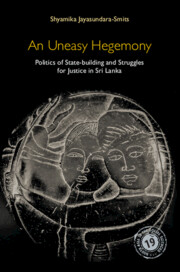Book contents
- Frontmatter
- Dedication
- Contents
- List of Tables and Figure
- Preface
- Acknowledgements
- List of Abbreviations
- 1 Introduction
- 2 Politics of Judgement
- 3 From Nationalism to Ethnic Supremacy
- 4 Political Patronage: Underbelly of Everyday Politics
- 5 State Institutions and Patronage Politics
- 6 War and Peace as Politics by Other Means
- 7 What Came after War?
- Afterword
- Appendix 1 Map of Sri Lanka
- Appendix 2 Indication of Background of Key Interviewees (from January to May 2009)
- Bibliography
- Index
1 - Introduction
Published online by Cambridge University Press: 29 July 2022
- Frontmatter
- Dedication
- Contents
- List of Tables and Figure
- Preface
- Acknowledgements
- List of Abbreviations
- 1 Introduction
- 2 Politics of Judgement
- 3 From Nationalism to Ethnic Supremacy
- 4 Political Patronage: Underbelly of Everyday Politics
- 5 State Institutions and Patronage Politics
- 6 War and Peace as Politics by Other Means
- 7 What Came after War?
- Afterword
- Appendix 1 Map of Sri Lanka
- Appendix 2 Indication of Background of Key Interviewees (from January to May 2009)
- Bibliography
- Index
Summary
Sri Lanka's trajectories of state-building and politics remain interesting topics in scholarly research and public discussion, sometimes but not always for the right reasons. For decades, Sri Lanka has attracted attention as a general topic of interest in a fairly narrow scholarly set of circles, mainly with a focus on Asian studies, area studies and Indian Ocean studies. The country has also been an interesting case study for academic research on subjects ranging from politics, state-building, democracy and post-conflict peacebuilding. The primary lens across the political science studies on the country, however, has come to be that of ethnic conflict. The popularity of the category of ‘ethnic conflict’ in the post–Cold War period was not unique to Sri Lanka (Sadowski 1998), but a global phenomenon, much of it thanks to the popularity of the ‘new wars’ thesis and the West's promotion of liberal peace in pursuit of a new ‘global interventionary order’ by effectively promoting and instrumentally using the non-governmental organisations, at an industrial scale (Richmond 2020).
The country's most spectacular achievements seem firmly stuck in the rapidly retreating past. Once celebrated as a model democracy in the former British Empire, after independence Sri Lanka was lauded for its impressive achievement in terms of human development indicators. Compared to its neighbours, its social welfare policies were seen as a model of social democracy. Among such jubilatory observations, there were periodic incidents of communal violence, even before the idyll was shattered by the onset of civil war in 1983.
Since the island's civil war began officially in 1983, fighting between the Sri Lankan government and the Liberation Tigers of Tamil Eelam (LTTE) has led to the country being recast as no longer ‘Paradise’ but as ‘Paradise Lost’. In much of academic literature, the public media and private portrayals of the country, discourses have become negative, dramatising the grim overtones and persistence of inter-ethnic enmities. A powerful Sinhala-Buddhist nationalism, recurring cycles of inter-ethnic violence and corruption at the level of Sri Lanka's political and economic elites are all ingredients in the new mix. These are all dominant themes in recent accounts of the condition of Sri Lanka's state, society and politics. The intensity of the discussion, whether among serious scholars or in a public gathering or in a family discussion, can result in heated debates. Polarisation can be worsened, risking making enemies of colleagues, friends and even family members.
- Type
- Chapter
- Information
- An Uneasy HegemonyPolitics of State-building and Struggles for Justice in Sri Lanka, pp. 1 - 35Publisher: Cambridge University PressPrint publication year: 2022

